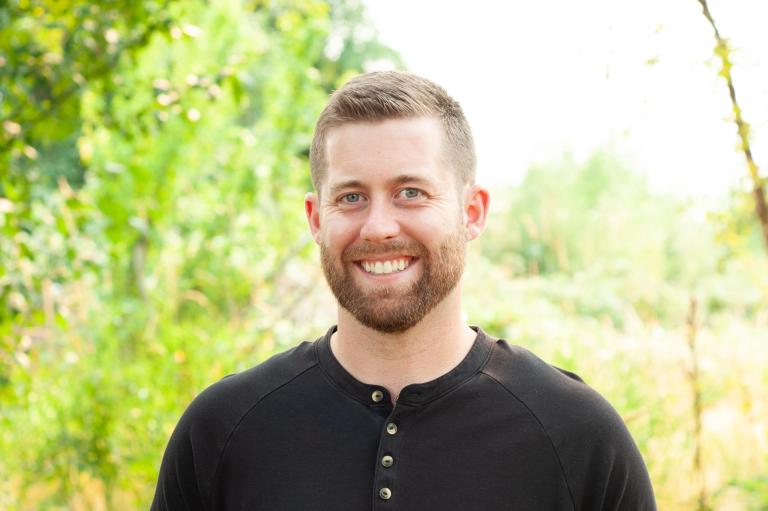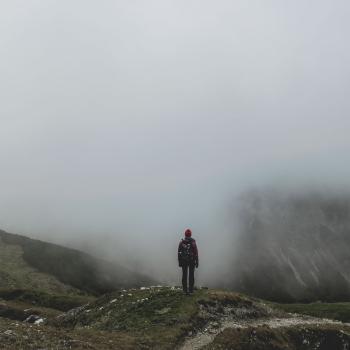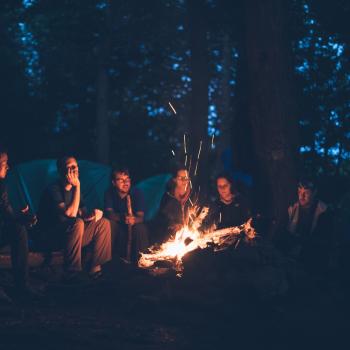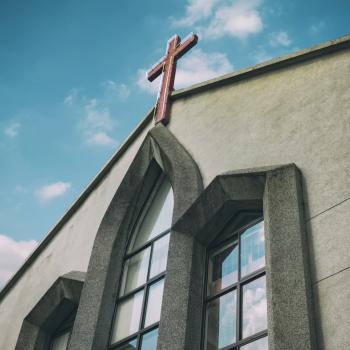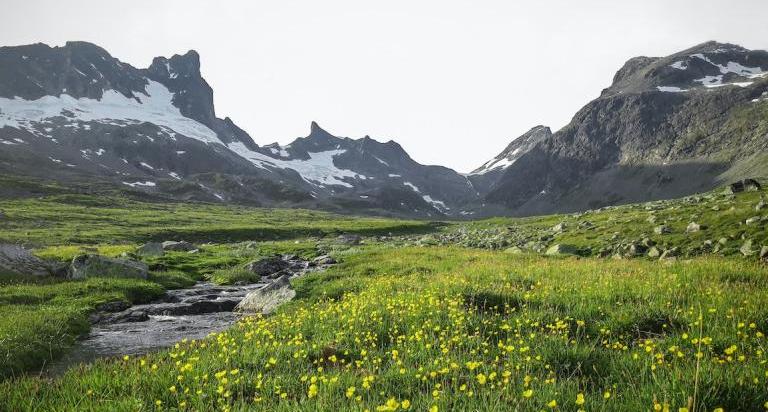
It’s a strange thing to be connected with so many Christian clergy and yet have no faith community of my own, no desire to be in church, and feel constantly on-edge when Christendom comes up in conversation.
And yet here we are.
When I voice my hesitancy and questions with my clergy friends, I often find deep resonance; that even though they are paid leaders, they also have personal questions about faith and the Divine, consistent and unresolved frustrations with their denominations and organizations, and many are simply burned out. Working within the caring industry is an exhausting endeavor and I’ve heard many clergy share that their institutions feel like Titanics waiting for the end to come.
A few weeks ago, I had the joy of speaking with a pastor friend of mine, Aaron Strietzel. In many ways, I feel that Aaron also sits in the midst of this – he knows the realities of pastoring in 2022 and the state of the church, holds his own questions about God, and has actively worked to uncover a sense of the Divine that feels true. He is a contemplative, one of the kindest souls you’ll ever meet, and has a true calling to stewardship; he wants to be part of the movement to help our world become healthier and more whole.
Below is our conversation, ranging from contemplative spirituality, his calling as a pastor, imagery of the Divine, and what faith communities that integrate contemplation and action might look like.
Andrew: For as long as I’ve known you, you’ve been both a professional pastor and you’ve been engaged in a more contemplative spirituality not often seen in the Church. What has your experience been of holding these two together? Does it feel like tension?
Aaron: It does and it doesn’t feel like a tension. Personally, I feel drawn to the contemplative path before I feel called to be a pastor. Everything I do I hope flows out of this. I know that isn’t always the case, but it is something I want to grow into more every year.
The tension is that in my experience the average Christian in church has little draw to the contemplative life. Most have little understanding about what a contemplative spirituality even is, so it’s hard to blame people that they aren’t hungry for it. Unfortunately I think that the majority of people who attend church on Sundays are content just to show up, sing a little, hear a good sermon, and then get on with the rest of their lives. The focus of most churches tends to be more on theology and intellectual understanding than on any sort of deeper spiritual experience.
I wonder what it would look like if churches dug deeper into contemplative spirituality and became a sort of school for contemplative living? We might lose some people, maybe a lot of people, but I wonder how it would change the people who stayed!
Andrew: It would be a big – huge – shift. And require an entirely new focus on who and how God works: a God right here, rather than a God out here. Do you remember when the traditional image of the Divine – the Zeus in the sky kind of figure – began to fall away for you? What did that look like and feel like?
Aaron: Yes, it was a long slow process that began while I was finishing up undergrad at an evangelical Bible College in my mid-20s. I was taught that the Bible was inerrant – basically literally true in everything – and that was beginning to fall apart for me. It took years before I really began to be able to articulate what was happening, and I wrestled with many questions.
Looking back I think the question you asked was at the heart of all the other questions: Who is God and what is God like?
If anyone is interested in exploring more about this topic on moving away from a Zeus like “sky god”, I found Jim Marion’s book The Death of a Mythic God to be incredibly helpful.
(Note from Andrew: I totally second Aaron on this! It’s a very good book to work with.)
Andrew: I remember seeing a while ago that you were writing about domestication: the domestication of Jesus, the domestication of God, for example. In your mind, what is the impact of this domestication on us as a society and how can we “re-wild” our understanding of the Divine?
Aaron: Here’s what I think the struggle is underneath the domestication of God. We humans like things organized, neat and tidy, and we like things to feel safe and predictable. We then transfer this desire onto the divine. The unfortunate result is that we create codes, dogmas, and doctrines, and thus establish what Richard Rohr calls a transactional view of God.
Christians have transferred this onto Jesus as well. We have domesticated Jesus by making him something that is safe, nice, and secure, even though Jesus was a wild, nomatic prophet who challenged the status quo everywhere he went!
I think we can “re-wild” our understanding of the divine in numerous ways. Spending time in nature is one of the best ways for me personally. Nature isn’t safe and secure, but there’s a beauty, sacredness, and “wildness” there we can connect with and experience.
Also finding blogs like this one, books, podcasts or other resources from people who introduce us to different ways of seeing can be very helpful. I think that if we intentionally open ourselves up to experience the divine in new, raw, and wild ways the Sacred will take us up on the invitation and will present herself.
(Another note from Andrew: I’ve shared a couple lists of phenomenal books that have really helped deepen my spirituality here and here.)
Andrew: I often find myself searching for spiritual communities outside the Church and feeling like I’m drawing a blank. It can be a lonely experience! What do you think communal spirituality can look like for those of us who aren’t going back into churches any time soon?
Aaron: That’s a good question, and a challenging one. Like you I think community is essential to spiritual growth and formation. I resonated with your first post about being in a liminal space. I think we are in a time in history where many of the traditional ways of doing things – including religious gatherings – are ending, but the new isn’t fully here.
That invites experimentation and exploration, but also feels a little unsettling and disorienting (again, I think we prefer something we know that feels safe rather than the unknown). It is lonely, but it is also exhilarating! We need people to experiment with new ways of cultivating spiritual communities to help us move forward because these kinds of communities are the only way we can move forward!
Here’s a few thoughts on what it might look like.
It won’t all look the same. It will be contextual. That being said, I think future spiritual communities will need to infuse holistic spiritual practices (meditation, yoga, nature walks, etc) with deep intellectual dialogue and exploration.
- A spiritual community might begin by inviting people to a book discussion where you will meditate for 20 minutes beforehand and then read about indigenous spirituality.
- A spiritual community might start by inviting people to gather for a hike, knowing that there will be time to sit in silence and then discuss what they experienced or learned about the sacred.
- A spiritual community may begin by doing a 30 min yoga practice, followed by a short video from a spiritual teacher.
- A spiritual community may begin by service – seeing a need in the community – that is followed by discussion on the interconnect of action and contemplation.
Andrew: I’m very aware that there are folks in communities all over the world doing things like this: experimenting, meeting in a radically different way, recentering what it means to commune together and with the Divine. For you and your own journey, who has been a spiritual mentor for you, either inside the Christian tradition or outside of it?
Aaron: Richard Rohr has been my greatest mentor over the last decade, though I have never had the fortune of meeting him. Brian McLaren and Brené Brown are also two of my favorite authors. My own journey has followed alongside McLaren’s in many ways and I’m grateful for his continued work. Cynthia Bourgeault and James Finely have written some great books on the contemplative path.
More recently, and outside of the Christian tradition, I’ve discovered the work of Bill Plotkin and James Hollis. James Hollis is a Jungian analyst and has written many great books about the transition into a more meaningful second half of life by encouraging people to pay attention to their soul (psyche) by paying attention to their unconscious. As someone who is walking through a midlife transition myself, his work has been very helpful.
Bill Plotkin has written a few books, but has done a lot of work with nature and the idea of “growing up,” or becoming a true adult in this world. Plotkin believes that our society has few “elders” (not in age but in wisdom) because we actually have few “adults” – people who have really “grown up” and moved beyond adolescence (again not in age but in psycho-spiritual growth). He argues, fairly convincingly I must say, that our disconnection from the “wildness” of nature is a major cause of our arrested development and that as we get more in touch with nature we can connect with our own deeper identity (what Plotkin calls a mytho-poetic identity) and live from that “inner knowing” in our external world. His work can be found here.
You can find more from Aaron on his website, https://aaronstrietzel.com/

